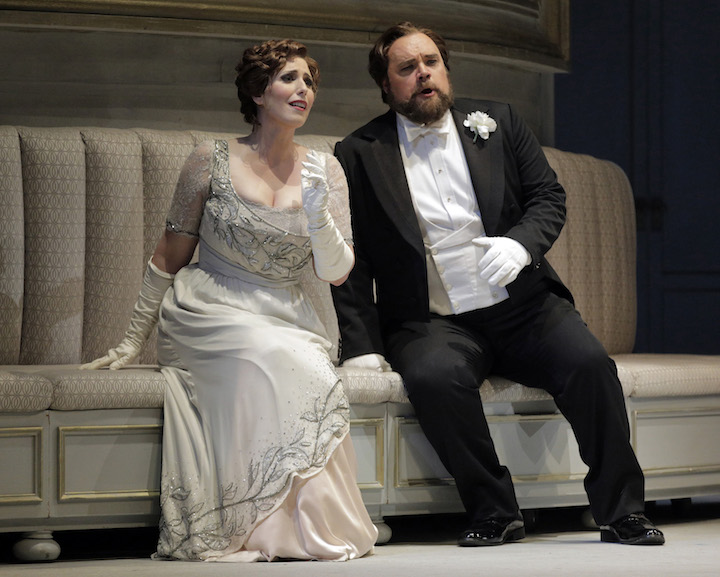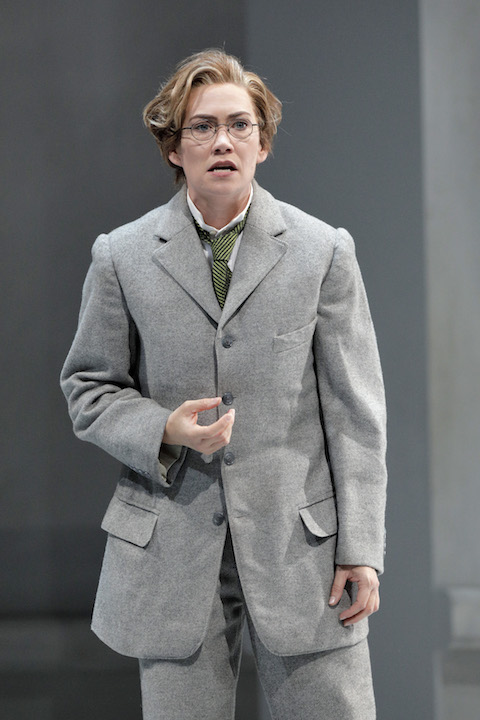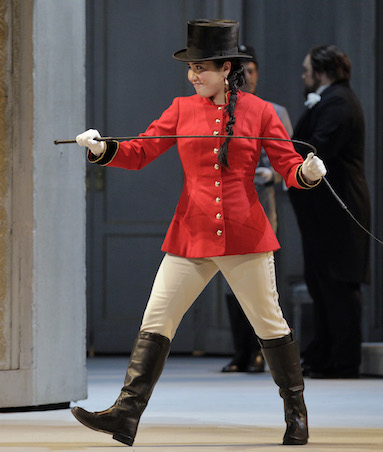Arabella, lovely Arabella, positioned to buy her family out of debt through marrying off her beauty to the highest bidder, but searching wistfully for Mr. Right. Can the two inharmonious approaches to love resolve into one happy ending?
In Richard Strauss’ opera they do indeed. And in the San Francisco Opera production that opened on Tuesday they resolve, like Tobias Hoheisel’s production design, from black and white into varieties of gray. Nonetheless suggesting, somehow, that an ever-after full of green and fertile country living, feudal power and courtly sex lurks just over the marital horizon and after the fall of the opera house curtain.

Strauss’ opera is full of lush late-Romantic music with a touch of modernist tension, and it’s one of his most alluring qualities as an opera composer. Conductor Marc Albrecht, who began his tenure with the Dutch National Opera conducting Strauss’ Die Frau ohne Schatten, clearly favors music from this period.
The opera itself was meant to repeat the success of Der Rosenkavalier, which Strauss and his librettist Hugo van Hofmannsthal had written 22 years earlier. In many ways it resembles that opera, with its meditations on love balanced by buffoonery and set in an upper-class Viennese milieu. But where the meditations of Der Rosenkavalier poignantly focus on the passage of time and its wearing away of life and love, Arabella focuses on the possibility of love at first sight and the recognition of love’s rightness. In that way it falls short of the depth of the earlier opera, providing a rosier outlook on the passage of time.
Director Tim Albery has moved the setting of the play from 1860s Vienna to 1910 Vienna, before the onset of WWI and the Austro-Hungarian capital’s fall as Europe’s cultural center. Certainly the costumes are sleeker.
Soprano Ellie Dehn sang the part of Arabella, and she cuts an elegant hourglass figure as she genteelly flirts her way through her role as financial savior to her gambling-crazed father and her feckless mother, who gives away her only remaining piece of valuable jewelry to a fortune teller. Dehn has a lovely voice and a gracious stage presence. She was well matched by baritone Brian Mulligan, he of the big and imposing voice and body, who sang Mandryka, the country landowner with the heaps of cash necessary to save everyone. Mandryka appears just as Arabella is about to decide which of her money-laden suitor will be her husband. He has been delayed in his pursuit of Arabella by being temporarily felled by a bear he was hunting. Staring at Arabella’s picture while healing in bed, he falls in love with her.

Here are two lovers who believe in the completeness of their desire. And, moreover, are drawn irrevocably to idealized love, embodying its rightness.
The fire in the opera was provided by sopranos Heidi Stober and Hye Jung Lee. Stober plays Zdenko, a trouser role forced on her by her loving parents, who can no longer afford to provide two dowries, one for each of their daughters. She is restless and dynamic in the role, hiding her love for Matteo (tenor-as-frantic-suitor Daniel Johansson) while providing support to her idolized sister Arabella. The first act duet between Dehn and Stober was one of the highlights of the performance. How Strauss reveled in those soprano-with-soprano duets! Simply the best.
Lee sings The Fiakermilli with a death-defying, doll-voiced coloratura. Dressed in a flaming scarlet uniform, she cracks the whip at the Hansom-drivers’ Ball, shepherding Arabella’s suitors into obeisance, and splashing up the beige-on-gray ballroom decor.

Michaela Martens and Richard Paul Fink put in wonderfully assured performances as Arabella’s frivolous parents, the Count and Countess Waldner. They never overstep the clownish roles, but rather strike a suitable silliness among the heavy breathing of love, requited and less likely to be requited. Scott Quinn (Count Elemer), Andrew Manea (Count Dominik) and Christian Pursell (Count Lamoral) sang the unhappy roles of rejected suitors.
This is a very palatable production, though perhaps not as gripping as the season’s motto of “Embrace Emotion” might suggest. The contrast of the restrained production with Strauss’ opulent score may give the viewer thought, however, opening a more subtle perspective on love from a world long ago and far away.
– Jaime Robles
San Francisco Opera’s production of Arabella continues through November 3. For tickets and information, visit sfopera.com.
